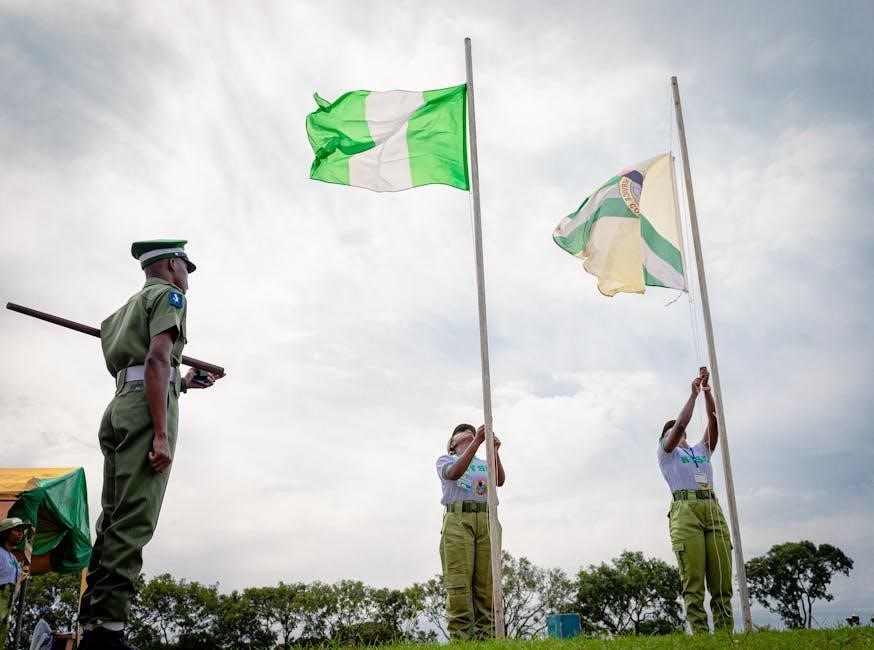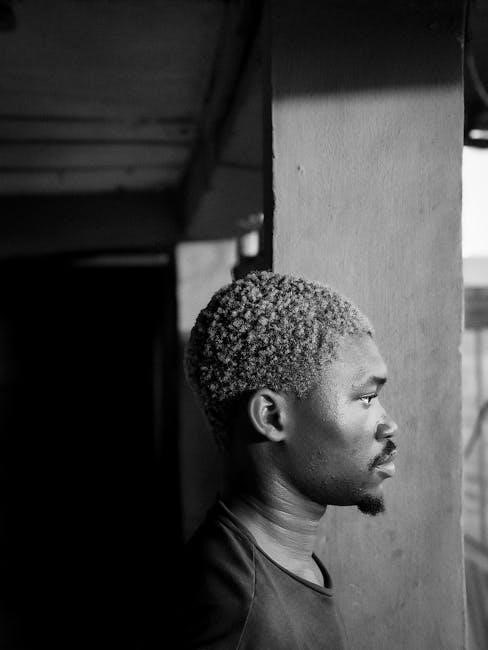Military coups have profoundly shaped Nigeria’s political landscape, with frequent interventions from 1966 to 1999. These events, driven by corruption and ethnic tensions, disrupted governance and hindered democratic progress.
Definition and Historical Context
A military coup refers to the seizure of power by armed forces, often replacing civilian governments. In Nigeria, coups became a recurring phenomenon after independence in 1960, with the first occurring in 1966. These interventions were driven by political instability, corruption, and ethnic tensions. The period from 1966 to 1999 saw prolonged military rule, with eight regimes emerging within 33 years. Coups disrupted democratic processes, deepened ethnic divisions, and undermined governance. This historical context highlights the complex interplay of political, economic, and social factors that have shaped Nigeria’s experience with military interventions, leaving a lasting impact on its political landscape and civil-military relations.
Significance of Studying Military Coups in Nigeria
Studying military coups in Nigeria is crucial for understanding the nation’s governance challenges and political evolution. These events reveal the interplay of corruption, ethnic tensions, and economic instability that have shaped the country’s history. Analyzing coups provides insights into civil-military relations, democratic consolidation, and the resilience of authoritarian rule. It also highlights the broader implications for regional stability, as Nigeria’s experiences influence West Africa’s political landscape. By examining the causes and consequences of coups, scholars and policymakers can identify patterns and lessons to strengthen democratic institutions and prevent future interventions, ensuring sustainable governance and security in the region.
History of Military Coups in Nigeria
Nigeria experienced its first military coup in 1966, marking the beginning of recurrent interventions. Between 1966 and 1999, the country endured eight military regimes, shaping its governance and democracy.
The First Military Coup of 1966
The first military coup in Nigeria occurred on January 15, 1966, led by a group of army officers primarily from the Igbo ethnic group. They overthrew the government of Prime Minister Tafawa Balewa and President Nnamdi Azikiwe, citing widespread corruption and political instability. The coup marked the end of the First Republic and ushered in military rule under General Aguiyi-Ironsi, who was not directly involved in the coup but became the head of state. This event set the stage for a series of coups and counter-coups, leading to prolonged military rule and deepening ethnic tensions that would later escalate into civil war.

The 1966 Counter-Coup and Its Aftermath
The 1966 counter-coup, led by northern military officers, overthrew General Aguiyi-Ironsi’s government in July 1966. This reaction was fueled by perceptions of Igbo dominance and the unaddressed grievances of other regions. The coup brought General Yakubu Gowon to power, intensifying ethnic tensions. The aftermath saw widespread violence against the Igbo, leading to the Biafra civil war in 1967. This counter-coup deepened political instability and ethnic divisions, setting the stage for prolonged military rule and undermining efforts to establish a stable democratic framework in Nigeria.
Military Rule from 1966 to 1999
Nigeria experienced uninterrupted military rule from 1966 to 1999, marked by eight distinct regimes. Key leaders included General Yakubu Gowon, who oversaw the civil war, and General Murtala Mohammed, known for anti-corruption reforms. General Olusegun Obasanjo handed power to civilians in 1979, but General Muhammadu Buhari seized control in 1983. The regime of General Ibrahim Babangida introduced controversial economic reforms, while General Sani Abacha’s rule was notorious for human rights abuses. This period saw political instability, corruption, and economic mismanagement, undermining Nigeria’s development and fostering widespread disillusionment with military governance.
The 1993 Coup and Its Impact
The 1993 coup, led by General Sani Abacha, overthrew the interim government established after the annulled June 12, 1993, presidential election. This event marked a significant setback for Nigeria’s democratic transition. Abacha’s regime was characterized by authoritarian rule, human rights abuses, and widespread corruption. The coup deepened political instability and led to international sanctions. Civil society and opposition groups faced severe repression, further entrenching military dominance. The 1993 coup underscored the challenges of transitioning from military rule to democracy, leaving a lasting impact on Nigeria’s political landscape and civil-military relations.
Causes of Military Coups in Nigeria
Military coups in Nigeria stem from political instability, corruption, economic inequality, and ethnic tensions, which have historically created an environment conducive to military intervention in governance.
Political Instability and Corruption
Political instability and corruption have been central drivers of military coups in Nigeria. The 1966 coup, for instance, was triggered by widespread corruption and political chaos following independence. Successive civilian governments failed to address these issues, leading to recurring military interventions. Corruption undermined public trust in governance, while political instability created power vacuums that the military exploited. This cycle of mismanagement and intervention perpetuated authoritarian rule, stifling democratic growth and fostering a culture of impunity. The persistent failure of civilian regimes to deliver good governance remains a key factor in Nigeria’s history of coups.
Economic Factors and Inequality
Economic mismanagement and inequality have significantly contributed to military coups in Nigeria. The 1966 coup was partly driven by economic disparities and poor governance, which fueled public discontent. Successive regimes failed to address poverty, unemployment, and unequal resource distribution, exacerbating societal tensions. Economic instability created an environment where military interventions were seen as solutions to systemic failures. The concentration of wealth among elites further alienated marginalized groups, undermining civilian rule. These economic grievances, coupled with political corruption, have historically provided justifications for military takeovers, perpetuating a cycle of instability and authoritarianism in Nigeria.
Ethnic and Regional Tensions
Ethnic and regional tensions have played a pivotal role in Nigeria’s history of military coups. The 1966 coup was fueled by ethnic mistrust, with northern leaders perceiving the initial coup as an Igbo-dominated plot. This led to a counter-coup in July 1966, which targeted Igbo officers and civilians, escalating into the Biafra secession attempt and civil war. Regional disparities in resource allocation and political representation further exacerbated tensions, creating an environment where military leaders often justified interventions as necessary to restore balance. These ethnic and regional divisions have historically legitimized military actions, undermining civilian governance and deepening Nigeria’s political fractures.
Key Figures in Nigerian Military Coups
Figures like General Aguiyi-Ironsi, Yakubu Gowon, Murtala Mohammed, Olusegun Obasanjo, Ibrahim Babangida, Sani Abacha, and Muhammadu Buhari played pivotal roles in shaping Nigeria’s coup history and political landscape.

General Aguiyi-Ironsi and the 1966 Coup
General Aguiyi-Ironsi emerged as Nigeria’s first military head of state after the January 15, 1966, coup, which overthrew the post-independence government. Though not directly involved in the coup, he became the highest-ranking officer and assumed power. His regime introduced Decree 34, centralizing authority, but faced opposition from northern officers. On July 29, 1966, a counter-coup led to his overthrow and death. His tenure marked the beginning of prolonged military rule, deeply influencing Nigeria’s political instability and ethnic tensions, setting the stage for the civil war and decades of authoritarian governance.
General Yakubu Gowon and the Civil War
General Yakubu Gowon became Nigeria’s head of state after the 1966 counter-coup and led the country through its civil war (1967–1970). The conflict arose from ethnic tensions and the secession attempt by Biafra. Gowon’s leadership focused on maintaining national unity, implementing policies like the “No Victor, No Vanquished” doctrine post-war. His regime emphasized reconciliation and reconstruction, though challenges persisted. Gowon’s tenure was marked by both the unification of Nigeria and ongoing political instability, shaping the nation’s trajectory during a tumultuous period.
General Murtala Mohammed and His Reforms
General Murtala Mohammed, who seized power in 1975, implemented sweeping reforms to address corruption and inefficiency. His regime focused on purging the civil service, recovering illicit wealth, and improving public services. Mohammed also introduced measures to increase transparency and accountability in governance. His leadership was marked by a strong commitment to national development, including plans for economic restructuring and social welfare. Despite his assassination in 1976, Mohammed’s reforms set a precedent for future leaders, emphasizing the need for ethical governance and institutional integrity in Nigeria’s post-coup political landscape.
General Olusegun Obasanjo and Civil-Military Relations
General Olusegun Obasanjo played a pivotal role in shaping civil-military relations in Nigeria. As a military leader, he participated in the 1966 counter-coup and later became Head of State, ruling from 1976 to 1979. Obasanjo’s regime introduced the “Operation Feed the Nation” initiative to boost agriculture and reduce dependency on oil. He also established the “Office of the Auditor-General” to enhance accountability. His transition to civilian rule in 1979 marked a significant step toward democracy. Later, as a civilian president from 1999 to 2007, Obasanjo implemented reforms to strengthen democratic institutions and improve civil-military relations, leaving a lasting legacy in Nigerian governance.
General Ibrahim Babangida and the 1985 Coup
General Ibrahim Babangida seized power in 1985 through a bloodless coup, overthrowing General Muhammadu Buhari. His regime, which lasted until 1993, introduced the Structural Adjustment Programme (SAP) to address economic crises. Babangida’s rule was marked by political repression and the annulment of the 1993 presidential election, which led to widespread unrest. Despite his efforts to transition to civilian rule, his legacy remains controversial due to the failed democratic process and the political instability that followed. Babangida’s tenure highlights the challenges of military governance and its impact on Nigeria’s democratic evolution.
General Sani Abacha and His Regime
General Sani Abacha seized power in 1993, following the annulment of the June 12 presidential election. His regime was marked by severe human rights abuses, political repression, and widespread corruption. Abacha’s government faced international sanctions due to its brutal suppression of opposition, including the execution of environmental activist Ken Saro-Wiwa. Despite economic policies aimed at stabilizing the nation, his rule deepened corruption and inequality. Abacha’s sudden death in 1998 paved the way for Nigeria’s transition to democracy. His regime remains a symbol of authoritarianism and the dark era of military rule in Nigeria’s history.
General Muhammadu Buhari and His Role in Military Politics
General Muhammadu Buhari rose to prominence after leading a military coup in 1983, overthrowing the civilian government of President Shehu Shagari. His regime emphasized anti-corruption and discipline, earning him both admiration and criticism. Buhari’s leadership was marked by strict policies, including the controversial War Against Indiscipline. Despite his authoritarian approach, he implemented reforms aimed at economic recovery. His tenure ended in 1985 after a counter-coup led by General Ibrahim Babangida. Buhari’s military legacy is complex, blending efforts to restore order with criticisms of human rights abuses. His later transition to democratic politics, winning the presidency in 2015, underscores his enduring influence in Nigerian politics.

Impact of Military Coups on Nigerian Democracy
Military coups disrupted civilian rule, fostering political instability and hindering democratic progress. The 1993 coup, for instance, led to prolonged military governance, undermining Nigeria’s democratic consolidation efforts.
Disruption of Civilian Rule and Governance
Military coups in Nigeria repeatedly disrupted civilian rule, plunging the nation into cycles of authoritarian governance. The 1993 coup, which annulled the June 12 election, exemplified this disruption, leading to General Sani Abacha’s oppressive regime. Such interventions undermined democratic institutions, fostering political instability and public distrust. The frequent transition from civilian to military rule stifled governance, as policies often prioritized regime survival over national development. This pattern of disruption has left lasting scars on Nigeria’s political landscape, hindering efforts to establish a stable and enduring democratic system.
Effects on Democratic Consolidation
Military coups in Nigeria have severely hindered democratic consolidation by undermining trust in democratic institutions. Repeated interventions disrupted electoral processes, as seen in the annulment of the 1993 June 12 election, eroding public confidence. The frequent overthrow of civilian governments created a cycle of instability, making it difficult to establish enduring democratic norms. Fear of military intervention lingered, discouraging robust political participation and weakening party systems. This instability delayed critical reforms, leaving Nigeria’s democracy fragile and vulnerable to authoritarian influences, even after transitioning to civilian rule in 1999.

Civil-Military Relations in Post-Coup Nigeria
Post-coup Nigeria has seen efforts to redefine civil-military relations, emphasizing civilian oversight and military professionalism. Since the transition to democracy in 1999, reforms have aimed to reduce military interference in politics. However, challenges persist, as the military continues to play a significant role in internal security and combating insurgency. Civilian governments have struggled to assert full control, often relying on the military for stability. Despite progress, lingering mistrust and occasional political interference in military affairs underscore the need for stronger institutional frameworks to ensure a balanced and democratic civil-military relationship, crucial for Nigeria’s long-term stability and security.

Regional and International Implications
Military coups in Nigeria have destabilized West Africa, inspiring similar interventions in neighboring countries. The resurgence of coups in the region undermines democratic progress and regional stability.
The Resurgence of Coups in West Africa
The resurgence of military coups in West Africa, particularly between 2010 and 2022, has raised concerns about democratic stability. Nigeria’s history of coups, including the 1993 coup, has influenced regional dynamics. The 2023 overthrow in Niger highlights how these events exacerbate security challenges in neighboring countries like Nigeria, undermining efforts to consolidate democracy and maintain regional stability. This trend poses significant risks to the region’s political and economic development.
Nigeria’s Role in Regional Stability
Nigeria, as a regional powerhouse, plays a crucial role in West Africa’s stability. However, its history of military coups and political instability has impacted neighboring countries. The 2023 coup in Niger, for instance, heightened security concerns due to shared borders. Nigeria’s efforts to promote democracy and stability in the region are vital, yet its internal challenges, such as corruption and ethnic tensions, often hinder progress. The current administration has emphasized the need to address unconstitutional changes in government, reflecting Nigeria’s commitment to regional security and democratic values. Its influence remains significant in shaping West Africa’s political landscape.

Legacy of Military Coups in Nigeria
Military coups left a lasting impact on Nigeria, shaping its political trajectory. The transition to democracy in 1999 marked a turning point, but challenges persist.
Lessons Learned and Reforms
The legacy of military coups in Nigeria has led to significant reforms aimed at strengthening democratic institutions. The transition to democracy in 1999 marked a turning point, with efforts to address corruption, improve governance, and enhance civil-military relations. Constitutional amendments, anti-corruption measures, and electoral reforms have been implemented to prevent future coups. Civil society and international partners have played crucial roles in promoting accountability and transparency. Despite progress, challenges remain, including ethnic tensions and economic inequality, which continue to test Nigeria’s democratic stability and the effectiveness of its reforms.
The Future of Civil-Military Relations
The future of civil-military relations in Nigeria hinges on strengthening democratic institutions and ensuring accountability. Post-1999 reforms have established a framework for civilian oversight of the military, but challenges persist. Ethnic tensions, corruption, and economic inequality remain potential triggers for instability. Sustained efforts to professionalize the military and promote transparency are essential. Civil society and international partners play a crucial role in fostering dialogue and accountability. Nigeria’s ability to prevent future coups depends on addressing these underlying issues and maintaining a commitment to democratic governance and the rule of law.

